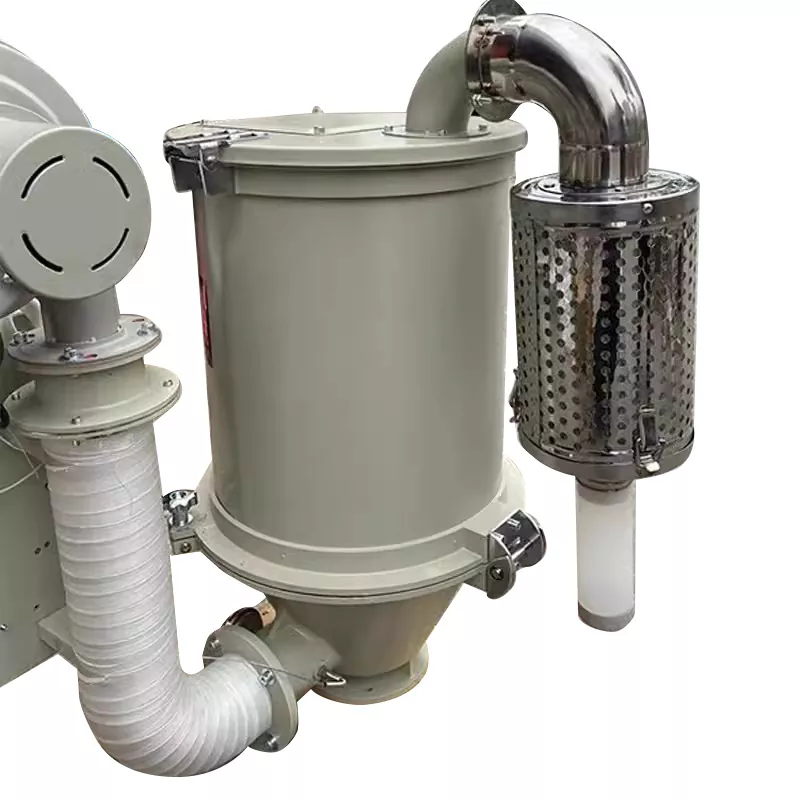What Is a Dust Collector and Why Is It Essential for Clean Air in Industrial Settings?
2024-11-20
In industrial environments, managing airborne dust and particles is a critical concern, not only for maintaining the cleanliness of the workplace but also for protecting the health of workers and the functionality of machinery. This is where a dust collector comes into play. But what exactly is a dust collector, and why is it so essential for industrial operations? Let’s explore its functions, benefits, and why it’s necessary for ensuring both safety and efficiency in industrial settings.
What Is a Dust Collector?
A dust collector is a mechanical device designed to capture and remove airborne particles, dust, and debris from the air in industrial environments. These systems are typically used to prevent the accumulation of dust that can contaminate products, harm workers’ health, and cause equipment malfunctions. Dust collectors are particularly common in industries such as woodworking, metalworking, pharmaceuticals, and mining, where dust is an inevitable byproduct of production processes.
Dust collectors operate by creating airflow that draws dust-laden air into the system, where it is filtered and cleaned before being released back into the environment. They are equipped with various types of filters and bags designed to trap fine particles, ensuring that the air in the workplace is safe, clean, and free from harmful pollutants.
How Do Dust Collectors Work?
Dust collectors work through a basic filtration process. The system uses a fan or blower to create suction, pulling air into the collector. The air passes through filters—often fabric or bag filters—that capture the dust and particles. There are several different methods used in dust collection, each suited to specific types of dust and industrial applications:
1. Baghouse Dust Collectors: These are large, industrial-sized systems with fabric filters that capture dust. The dust is collected on the surface of the bags, and periodically, the system shakes or pulses the bags to remove the accumulated dust.
2. Cyclone Dust Collectors: Cyclone systems use centrifugal force to separate larger particles from the air, which then fall into a bin or hopper for disposal. These are typically used in combination with other types of collectors for more thorough cleaning.
3. Cartridge Collectors: These systems use pleated filter cartridges to capture smaller dust particles. They offer higher filtration efficiency and are commonly used in environments where fine dust is generated.
4. Wet Scrubbers: In wet scrubbers, water is used to capture dust particles. The air is passed through a water stream, and the moisture captures the dust, which is then removed. This system is effective for sticky or hazardous dust.
Why Are Dust Collectors Important?
1. Health and Safety
One of the most important reasons for using a dust collector is to protect workers' health. Exposure to airborne dust, especially fine particles, can cause a variety of respiratory issues, including lung diseases such as asthma, bronchitis, and even more severe conditions like pneumoconiosis or silicosis. A dust collector reduces the concentration of these harmful particles, minimizing health risks for employees.
2. Improved Air Quality
Dust in the workplace can significantly affect air quality, leading to a poor working environment. By capturing dust particles before they circulate throughout the facility, dust collectors help maintain better air quality, ensuring a healthier and more comfortable environment for everyone.
3. Preventing Equipment Damage
Excessive dust accumulation can cause damage to machinery, electrical components, and other equipment in an industrial facility. Dust can cause wear and tear on moving parts, leading to malfunctions, increased maintenance costs, and even equipment failures. A dust collector ensures that these particles are removed before they have a chance to interfere with operations.
4. Fire and Explosion Prevention
In certain industries, especially those dealing with flammable materials (like wood dust or metal powders), dust can pose a fire or explosion hazard. Dust collectors can help mitigate these risks by removing dust from the air before it accumulates to dangerous levels, reducing the likelihood of combustion and explosion.
5. Compliance with Regulations
Many industries are required to adhere to health and safety regulations that mandate the control of airborne contaminants. A properly installed and maintained dust collector can help businesses comply with these standards and avoid penalties, while also improving the overall efficiency of their operations.
Types of Industries That Use Dust Collectors
Dust collectors are found across various industries, including:
1. Woodworking and Carpentry
Wood dust is a common byproduct of woodworking, and it can pose significant health risks if not properly managed. Dust collectors are used in sawmills, wood factories, and carpentry shops to capture sawdust and prevent its spread throughout the facility.
2. Metalworking
In industries like welding, grinding, and machining, metal dust is generated that can damage equipment and create health hazards. Dust collectors capture this metal dust, ensuring a safer working environment and extending the lifespan of tools and machinery.
3. Pharmaceuticals and Chemicals
In pharmaceutical manufacturing, where fine powders and chemical dusts are common, dust collectors are used to ensure product purity and protect employees from inhaling hazardous substances.
4. Food Processing
Dust from ingredients such as flour, sugar, and spices can create unsafe environments in food processing plants. Dust collectors help control these particles, ensuring a cleaner, safer food production environment.
5. Mining and Construction
Dust is often generated during the extraction of minerals, mining activities, and construction work. Dust collectors are used to reduce the airborne dust that is created, protecting workers and the surrounding environment.
The Benefits of Using Dust Collectors
1. Enhanced Worker Productivity
Cleaner air leads to better working conditions, which in turn boosts employee morale and productivity. Workers are less likely to suffer from respiratory issues or fatigue due to dust exposure, allowing them to focus more effectively on their tasks.
2. Lower Maintenance Costs
By preventing dust buildup on machinery and equipment, dust collectors reduce the wear and tear on machines, leading to fewer breakdowns and less frequent maintenance.
3. Energy Efficiency
Modern dust collectors are designed to be energy efficient, using less power while providing high levels of filtration. This can lead to cost savings for businesses in the long run.
4. Environmental Benefits
Dust collectors not only improve air quality inside a facility but can also help reduce the impact on the environment by minimizing dust emissions that may be released into the atmosphere.
Conclusion: Why Are Dust Collectors Crucial for Industrial Operations?
In conclusion, a dust collector is an essential piece of equipment for any industry that generates dust or particulate matter. Its primary role is to protect workers’ health, improve air quality, prevent equipment damage, and ensure compliance with safety regulations. By capturing dust and particles before they have a chance to spread, dust collectors play a pivotal role in creating a safer, more efficient workplace. Whether you are working in woodworking, metalworking, pharmaceuticals, or any other dust-prone industry, investing in a reliable dust collection system is an investment in both safety and productivity.



